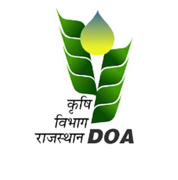About | Agriculture Department Rajasthan (ADR) , RAJASTHAN Check here latest notification
Agriculture Department, Rajasthan: The Pillar of Agricultural Advancement in the State
Introduction
Rajasthan, the largest state in India, faces various challenges in agriculture due to its diverse geographical and climatic conditions. To address these challenges and improve agricultural practices, the Agriculture Department of Rajasthan plays a pivotal role. This department is central to implementing agricultural policies, programs, and schemes aimed at enhancing farmers' livelihoods and boosting agricultural production. This blog delves into the role, key programs, and achievements of the Agriculture Department of Rajasthan.
Overview of the Agriculture Department, Rajasthan
The Agriculture Department of Rajasthan is a significant department of the state government responsible for overseeing and managing agricultural activities in the state. Headquartered in Jaipur, the department has several subordinate and regional offices that handle various agricultural activities.
Main Objectives of the Agriculture Department
1. Increase Agricultural Production: Implementing schemes and programs to boost crop yields and agricultural productivity.
2. Farmer Welfare: Providing various welfare schemes and support to improve farmers' livelihoods.
3. Climate Adaptation: Developing strategies and plans to address the impacts of climate change.
4. Technical Support: Supporting and promoting the latest agricultural technologies and research.
5. Survey and Evaluation: Monitoring and evaluating the status of the agricultural sector.
Key Programs and Schemes
1. Agriculture Cost and Benefit Scheme
Overview: This scheme provides financial assistance to farmers for agricultural production and helps cover production costs.
Features:
- Subsidies: Subsidies on fertilizers, seeds, and equipment.
- Loan Assistance: Interest subsidies on agricultural loans.
2. Water Conservation and Irrigation Schemes
Overview: In response to water scarcity, the state implements water conservation and irrigation schemes.
Features:
- Ravival Project: Improvement of water recharge and irrigation systems.
- Micro-Irrigation: Installation of drip and sprinkler irrigation systems.
3. Krishi Vigyan Kendra (KVK)
Overview: The objective of KVKs is to provide farmers with information on the latest agricultural technologies and research.
Features:
- Training Programs: Training and workshops for farmers.
- Technical Assistance: Providing information on new technologies and research.
4. Crop Insurance Scheme
Overview: This scheme aims to provide financial security to farmers against crop failures and natural disasters.
Features:
- Insurance Coverage: Coverage against crop damage.
- Prompt Claims: Quick claim settlement after disasters.
5. Agricultural Marketing Scheme
Overview: The scheme facilitates fair pricing for farmers' produce through agricultural marketing initiatives.
Features:
- Marketing Mandis: Establishment of markets for selling agricultural produce.
- Price Support: Arrangement of Minimum Support Price (MSP) for crops.
Major Achievements of the Agriculture Department
1. Increased Crop Production
Through the department's schemes and programs, significant improvements in crop production have been achieved. Adoption of modern technologies and advanced seeds has boosted yields.
2. Improved Water Conservation
Successful implementation of water conservation and irrigation projects has helped in efficient use of water resources, making agriculture viable even in drought-prone areas.
3. Farmer Welfare
Welfare schemes and insurance plans have enhanced financial security for farmers and reduced the impact of natural disasters.
4. Technological Advancements
Training and technical assistance provided by KVKs have helped farmers adopt new and improved techniques.
Challenges and Future Directions
1. Climate Change
Addressing the impacts of climate change requires adopting sustainable and climate-resilient agricultural practices.
2. Water Resource Management
Efficient management and conservation of water resources are crucial given the growing pressures of climate change and population.
3. Innovation in Agriculture
Applying new technologies and innovations in agriculture can improve production and management practices.
4. Farmer Awareness
Increasing awareness among farmers about technological and policy advancements is necessary for effective implementation.
Conclusion
The Agriculture Department of Rajasthan is a cornerstone in the state's agricultural development, dedicated to enhancing farmers' livelihoods and boosting agricultural production. Through various programs and schemes, it addresses farmers' issues and promotes innovation in agriculture. As Rajasthan navigates the challenges in its agricultural sector, the department's contributions remain a crucial factor in the state's agricultural progress.




